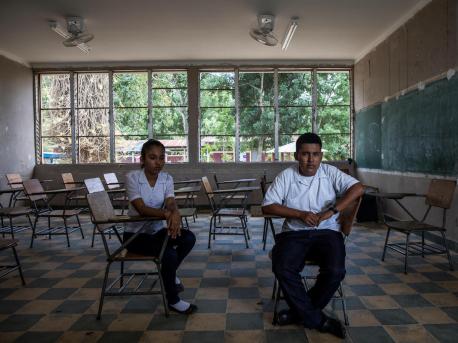
Young People Speak Out: End Violence in Schools Now
No one should be afraid to go to school. Yet for far too many students around the world, school is a dangerous place. Of the more than 1 million children and young people from 160 countries who responded to a UNICEF survey, two-thirds said they worry about violence in and around school.
The students shared their experiences of bullying, sexual harassment and corporal punishment — and provided ideas on what students, parents, teachers and governments can do to make schools safer.
Last December, a group of more than 100 young people from countries in Africa, Asia and the Americas convened in South Africa to draw up a set of recommendations detailing what they need to feel protected in and around school. At the event — hosted by UNICEF, Global Citizen, JCI and the Global Partnership to End Violence Against Children — the students drafted the #ENDviolence Youth Manifesto. Below, some strategies for making school a safe place for all:

PROMOTE RESPECT AND REPORT VIOLENCE. Peer mediators demonstrate a case of bullying at Branko Radicevic School in Mitrovica North, Kosovo. Bullied as an 11-year-old, Snazana Dzogovic, 16 (right), now teaches students how to identify and report bullies and ways to respect difference and resolve conflict. © UNICEF/UN0220913/Babajanyan VII Photo

TRAIN TEACHERS AND COUNSELORS TO USE POSITIVE DISCIPLINE. A UNICEF-supported professional development program in Cambodia teaches school personnel how to use positive discipline to reinforce good behavior, instead of resorting to corporal punishment. At Peam Ror School in Svay Rieng Province, Cambodia, teachers trained by UNICEF give students warnings using a card system like that used by soccer referees. After two yellow cards, a red card means a visit to the school director's office and a possible meeting with parents. © UNICEF/UN0235547/Llaurado

RESPOND TO SEXUAL VIOLENCE. Elsa (name changed), 16, was sexually harassed by her math teacher in Villanueva, Honduras. "I was very good at math, but from the beginning, he kept saying that I didn't know anything," she said. "He said, 'If you want to pass my class, you need to have intercourse with me or send pictures of your body.' I was so scared and uncomfortable in class that I didn't want to go to school anymore." She changed schools to get away from him. "Now I'll study for a career in tourism," she said. "I've lost all interest in math." © UNICEF/UN0232618/Zehbrauskas

BE KIND. "I am committed to ending violence because we are all human beings," said UNICEF Youth Advocate Muhd Saiful Ikhwan bin Musa from Malaysia, one of more than 100 young people and children who gathered in Sandton, South Africa in December 2018 to draft the UNICEF #ENDviolence Youth Manifesto. "My message to young people is to be kind to one another, always smile and help others when they need it. Kindness is contagious. I want to make a world without bullying or racism. We need each other to make a perfect world." © UNICEF/UN0261617/Hearfield
"Education is the key to building peaceful societies, and yet, for millions of children around the world, school itself is not safe," said UNICEF Executive Director Henrietta Fore. "Every day, students face multiple dangers, including fighting, pressure to join gangs, bullying — both in person and online — violent discipline, sexual harassment and armed violence. In the short term, this impacts their learning and in the long term, it can lead to depression, anxiety and suicide. Violence is an unforgettable lesson no child needs to learn."
Support UNICEF's work to #ENDviolence in and around schools and protect children all over the world.
Top photo: Josseline, 17 (left), Darwin, 16, and their friend Henry were targeted by bullies at school in Villanueva, Honduras. Darwin remembers Henry as a popular and caring boy, but his grades went down after the bullying began. Then he committed suicide. "I was hit very hard," said Darwin. "I still can't get over it." © UNICEF/UN0232617/Zehbrauskas
HOW TO HELP
There are many ways to make a difference
War, famine, poverty, natural disasters — threats to the world's children keep coming. But UNICEF won't stop working to keep children healthy and safe.
UNICEF works in over 190 countries and territories — more places than any other children's organization. UNICEF has the world's largest humanitarian warehouse and, when disaster strikes, can get supplies almost anywhere within 72 hours. Constantly innovating, always advocating for a better world for children, UNICEF works to ensure that every child can grow up healthy, educated, protected and respected.
Would you like to help give all children the opportunity to reach their full potential? There are many ways to get involved.



